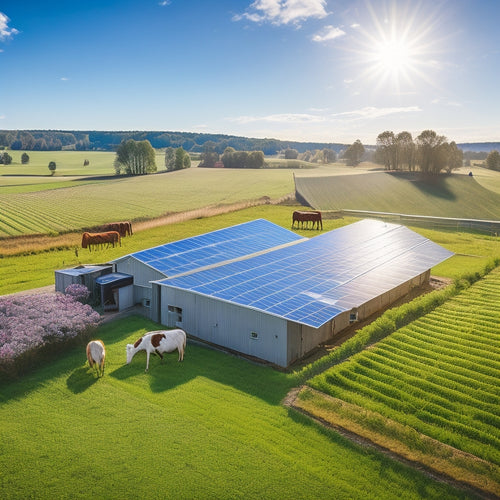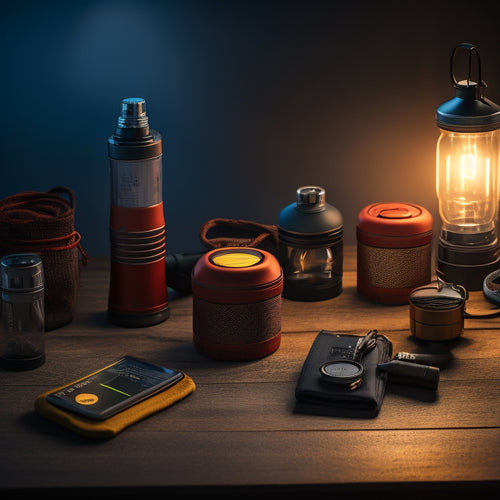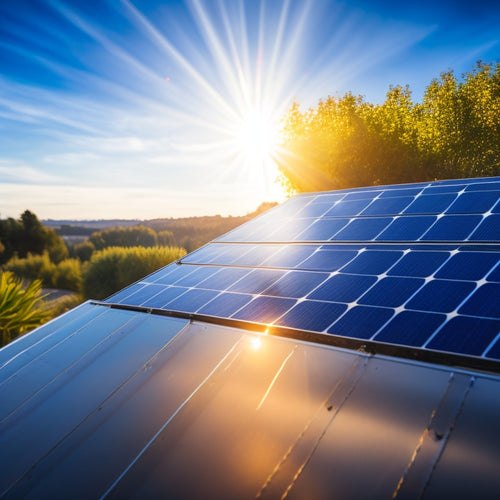
Common Applications of Generator Backup Systems
Share
Generator backup systems are vital for maintaining reliable power during outages in both homes and businesses. They guarantee critical appliances remain operational, thereby safeguarding your productivity and comfort. With options like portable, standby, and industrial generators, you can choose a system customized to your specific power needs. They can also represent a cost-effective, long-term investment by reducing reliance on grid power and minimizing energy expenses. Understanding your total wattage requirements is essential to prevent overload. By examining advancements in efficiency, you can enhance your energy management strategies and optimize performance. Exploring further reveals even more applications and benefits.
At a Glance
- Generator backup systems provide reliable emergency power supply for homes and businesses, ensuring uninterrupted operations during outages.
- They support essential appliances, preventing disruptions by matching generator capacity with critical device wattage requirements.
- Cost-effective long-term investment, these systems reduce energy expenses and reliance on grid power, insulating from rising electricity costs.
- Various generator types (portable, standby, industrial) and fuel options (diesel, propane, natural gas) cater to diverse power needs and preferences.
- Assessing power needs through load analysis ensures accurate generator matching, preventing overload and optimizing performance during peak demands.
Reliable Power During Outages
When outages occur, having an emergency power supply is vital for maintaining functionality in your home.
Your generator backup system guarantees that essential appliances stay operational, minimizing disruption to your daily life.
Battery backup systems offer an additional layer of security by providing energy independence for critical devices, such as medical equipment.
Understanding how to effectively support these appliances is key to maximizing your system's reliability during power failures.
Emergency Power Supply
Ensuring a reliable emergency power supply during outages is essential for both residential and commercial settings. Without it, you risk losing crucial time and resources. Portable generators and backup systems can offer the security you need to maintain operations and comfort during unexpected power failures.
Here's a quick comparison of power options:
| Power Source | Advantages | Disadvantages |
|---|---|---|
| Portable Generators | Easy to transport, versatile | Limited runtime, fuel-dependent |
| Standby Generators | Automatic activation, high capacity | Higher installation costs |
| Backup Systems | Seamless integration, dependable | Requires regular maintenance |
When selecting a power source, consider your specific needs. Portable generators can be an excellent choice for temporary use, while backup systems provide a more permanent solution. Understanding the capabilities and constraints of each option enables you to make informed decisions, ensuring you're prepared when outages occur. Having a strong emergency power supply not only safeguards your property but also supports your freedom to operate without disruption. Investing in the right system means you won't be left in the dark when you need power the most.
Essential Appliance Support
Emergency power supply systems play a significant role in maintaining the functionality of essential appliances during outages. When the power goes out, you need reliable backup to guarantee your household remains operational. Your choice of generator should prioritize appliance compatibility, allowing you to seamlessly power critical devices such as refrigerators, medical equipment, and heating systems.
Consider the backup frequency as well. Frequent outages can disrupt your daily life, so investing in a generator with a strong fuel supply and efficient output capacity can make all the difference.
Calculate the total wattage required for your essential appliances to verify your generator meets these demands without overloading. Moreover, it's crucial to assess the starting and running wattage of your appliances. Some devices require higher starting wattage, which could affect your generator's performance during peak demands.
By understanding these requirements, you can tailor your generator backup system to suit your needs. Ultimately, maintaining essential appliance support not only enhances your comfort during outages but also provides peace of mind.
With the right generator, you can enjoy the freedom of uninterrupted power, enabling you to live life on your terms despite unexpected interruptions.
Cost-Effective Long-Term Solution
Investing in a generator backup system can greatly reduce your energy expenses over time. By providing reliable power during outages, these systems not only enhance energy efficiency but also serve as a long-term investment that pays off through reduced operational costs.
Additionally, integrating renewable energy solutions, such as solar power backup systems, can further lower your monthly energy bills and enhance energy independence.
Analyzing your energy usage and backup needs will help you make an informed decision that maximizes your savings.
Reduced Energy Expenses
When you implement a generator backup system, you can markedly reduce your energy expenses over time. By utilizing the power of your generator during peak demand periods, you lessen your reliance on the grid, leading to substantial energy savings. This strategy allows for better budget management, as you'll see fluctuations in your energy bills diminish.
Moreover, generator systems often run on alternative fuels or are equipped with energy-efficient technologies, which can further decrease operating costs. By strategically using your generator, you can shift energy consumption to off-peak hours when rates are lower, maximizing your savings.
It's vital to analyze your energy usage patterns to effectively integrate a generator backup system into your overall energy strategy. Regular monitoring and adjustments can optimize performance, ensuring you're not just saving energy but also managing your expenses wisely. This proactive approach enables you, giving you the freedom to control your energy costs while maintaining reliability.
Embracing a generator backup system isn't just about immediate benefits; it's about establishing a sustainable, cost-effective solution that aligns with your long-term financial goals. By prioritizing energy savings, you position yourself for greater independence from unpredictable energy markets.
Long-Term Investment Benefits
Generator backup systems offer substantial long-term investment benefits that can greatly enhance your financial strategy. By integrating a generator into your infrastructure, you're not just buying a piece of equipment; you're making a strategic decision that aligns with effective financial planning.
These systems reduce your reliance on grid power, effectively insulating you from rising energy costs. Over time, this translates into significant savings that contribute to your overall investment returns.
When you consider the cost of power outages—lost productivity, damaged equipment, and emergency response expenses—the value of a reliable backup system becomes even clearer.
Moreover, generator systems often come with warranties and service plans, minimizing maintenance costs and enhancing their lifespan. This longevity guarantees that your initial investment continues to yield returns well beyond the average lifespan of traditional energy solutions.
Key Technical Specifications
When evaluating generator backup systems, understanding power output capacity is essential for ensuring your energy needs are met during outages.
Additionally, exploring various options for energy storage solutions can enhance your farm's operational efficiency.
You'll also need to take into account the various fuel type options available, as these can notably impact efficiency and operational costs.
Power Output Capacity
Power output capacity is a critical factor in evaluating backup generator systems, as it directly influences the system's ability to support vital loads during an outage.
When you're reviewing a generator, you'll need to perform accurate generator sizing to confirm it can handle your specific power requirements. This involves calculating the total wattage of all devices you'll need to run simultaneously, including appliances, HVAC systems, and lighting.
Load management plays a significant role in optimizing power output capacity. By prioritizing vital loads, you can identify which circuits to power during an outage, confirming critical systems remain operational while avoiding overloading the generator.
It's crucial to factor in both starting and running wattages, as some equipment, like refrigerators or air conditioning units, requires additional power to start.
Understanding your power output capacity also helps in selecting the right generator type—whether it's portable, standby, or a larger industrial unit.
Ultimately, the right generator sizing and effective load management enable you to maintain control over your energy needs, confirming you stay resilient during power interruptions.
Choose wisely to guarantee that your backup system meets your unique demands.
Fuel Type Options
Choosing the right fuel type for your backup generator can greatly impact its performance, efficiency, and operational costs. Diesel generators are known for their reliability and higher energy density, but they come with significant emissions impact and maintenance requirements.
If you're seeking cleaner alternatives, consider propane options, which offer easier fuel storage and lower emissions.
Natural gas is another viable choice, especially in urban areas where pipeline access is available; however, availability concerns can arise during extreme conditions.
For those prioritizing sustainability, renewable sources like biofuels or solar hybrids can enhance your energy independence, though they may require larger initial investments.
Hybrid solutions combine multiple fuel types, providing flexibility in fuel selection and operational efficiency.
Conducting a cost comparison among these options is essential; while diesel may seem cheaper upfront, long-term expenses—including fuel costs and maintenance—can shift the balance.
Ultimately, you must assess your specific needs and preferences to determine the best fuel type for your backup generator, ensuring it aligns with your desire for freedom and reliability.
Selecting Based on Power Requirements
When selecting a generator backup system, you must first assess your power needs to guarantee adequate coverage. Understanding the load capacity of your equipment will help you determine the appropriate generator size.
This careful evaluation prevents overloading and guarantees reliable operation during outages. Additionally, consider the importance of accurately calculating daily energy usage to assist in choosing the right generator for your specific requirements, as it can considerably impact your overall energy management strategy.
Monitoring energy consumption patterns can also inform energy usage assessments for a more effective backup solution.
Assessing Power Needs
Determining your power requirements is vital for selecting the right generator backup system. Start by conducting a load analysis, which involves identifying all the devices and appliances you plan to power during an outage. This process helps you calculate the total wattage requirements for your essential equipment.
Make a thorough list of appliances, including refrigerators, heating systems, and electronics, and note their wattage ratings. Add up the wattage to determine your peak and running wattage needs.
Don't forget to factor in starting watts, as some devices require additional power to start up, which can greatly increase your total wattage requirements.
Once you've established your total wattage, it's important to choose a generator that can handle this load efficiently. Oversizing isn't ideal, as it can lead to wasted fuel and increased wear on the generator.
Conversely, undersizing can result in power shortages, leaving you without adequate support during an outage.
Understanding Load Capacity
Understanding the load capacity of a generator is fundamental for ensuring it meets your power needs effectively. When selecting a generator, you must consider the total wattage of the devices you'll power. This involves capacity planning to determine both continuous and surge loads, as some appliances, like refrigerators, require more power at startup.
Load balancing is also essential; it helps distribute the power evenly across circuits, preventing overload and ensuring efficiency. Knowing the generator's rating in kilowatts (kW) allows you to match it with your load requirements accurately.
Consider adding a safety margin to account for unexpected power needs or future expansions. It's important not to exceed the generator's capacity, as doing so can lead to performance issues or damage.
Additionally, think about how long you might need backup power. If you plan for extended outages, you might want a generator with a higher capacity to support more devices for longer durations.
Ultimately, understanding these aspects will enable you to choose a generator that provides the freedom and reliability you need during power outages.
Higher Efficiency Ratings
When selecting a generator, higher efficiency ratings directly correlate with reduced energy consumption.
You'll find that generators with optimized designs convert fuel to electricity more effectively, minimizing waste.
This not only lowers operational costs but also contributes to a more sustainable energy approach.
Energy Consumption Reduction
Higher efficiency ratings in generator backup systems greatly reduce energy consumption, leading to both cost savings and environmental benefits. By investing in high-efficiency generators, you're not just ensuring reliable power; you're also enhancing energy efficiency and supporting sustainability practices. These systems are designed to convert fuel into electricity more effectively, minimizing waste and optimizing performance.
Here's a quick comparison of energy consumption metrics for different generator types:
| Generator Type | Efficiency Rating (%) | Annual Fuel Cost Savings ($) |
|---|---|---|
| Conventional Diesel | 30 | 500 |
| High-Efficiency Diesel | 40 | 750 |
| Natural Gas | 50 | 1,000 |
| Hybrid Systems | 60 | 1,250 |
As you can see, higher efficiency ratings correlate with significant fuel cost savings. By choosing an efficient generator, you're actively participating in reducing your carbon footprint while maximizing your energy usage. This commitment not only contributes to personal savings but also aligns with broader sustainability goals—ensuring a greener future for all. Accept these advancements in technology to enhance your freedom in energy management.
Frequently Asked Questions
How Often Should Generator Maintenance Be Performed?
You should perform generator maintenance every 100 hours of operation or at least annually. Regular maintenance enhances generator lifespan and guarantees peak performance, so don't neglect it to avoid costly repairs and downtime.
Can Generators Be Used Indoors?
You can't use generators indoors due to indoor safety concerns and ventilation requirements. Carbon monoxide buildup can be lethal. Always operate generators outdoors in well-ventilated areas to guarantee your safety and maintain your freedom.
What Fuel Types Are Available for Generators?
Did you know about 60% of portable generators run on gasoline? You've got options: diesel generators are fuel-efficient, propane generators burn cleaner, while natural gas offers convenience. Choose the best fuel type for your needs.
Are There Noise Regulations for Generators?
Yes, there are noise regulations for generators. You'll need to take into account generator noise levels and noise reduction measures to comply with local laws. Research specific regulations in your area to guarantee your generator operates legally and quietly.
How Long Can a Generator Run Continuously?
You might think a generator can run indefinitely, but most models have a maximum runtime of 8 to 12 hours for continuous operation. Regular maintenance and fuel checks guarantee ideal generator runtime and performance during extended use.
Explore More
In the domain of power reliability, generator backup systems symbolize a lifeline during outages, ensuring your operations remain uninterrupted. By investing in these systems, you're not just securing energy; you're fortifying your future against uncertainties. Remember, choosing the right system based on your specific power needs is as essential as the engine that drives it. With higher efficiency ratings, these generators serve as both shield and guide, directing you through the storms of electrical failure with steadfast strength.
Related Posts
-

What Do I Need to Know About Farm Solar Panels
When considering farm solar panels, you need to assess costs, benefits, and technical specifics. Initial investment c...
-

Best Solar Powered Flashlights for Emergency Situations
When you're choosing the best solar-powered flashlights for emergency situations, focus on their brightness, battery ...
-

How Efficient Are Thin Film Solar Cells
Thin film solar cells provide an innovative approach to energy generation, boasting efficiency rates generally betwee...


